7 Language Stimulation Tips for Toddlers
Parents often ask me about toddler language development. When should a child be talking? Should you worry if your child isn’t talking yet? What can you do to boost your child’s language development?
Here are some of the common questions we get about speech and language development of toddlers:
- My one-year-old doesn’t have any words, not even “mama.” At that age, my niece could already say “ball” and “book”! Should I be worried?
- My two-year-old seems to understand what I say, but he’s not yet talking. What should I do?
- I’m not a native English speaker. I want my baby to learn to speak English without an accent. Can I let him watch YouTube videos by native English speakers?
- Should I start teaching my toddler the alphabet? And how to count?
- My son doesn’t tell me when he needs something. We have to guess. But he can name all the dinosaurs!
- My 18-month-old isn’t talking yet. Everyone says to wait until he goes to school, and he will catch up and start talking. They say it’s too early to see a doctor about it.
In this article, we’ll answer these questions and more.
Why is language development important during the toddler years?
The first three years of life are the critical period for brain development. During this time, the brain is developing very fast. Brain cells are forming connections called synapses. Frequently used synapses grow stronger. Those that aren’t get lost.
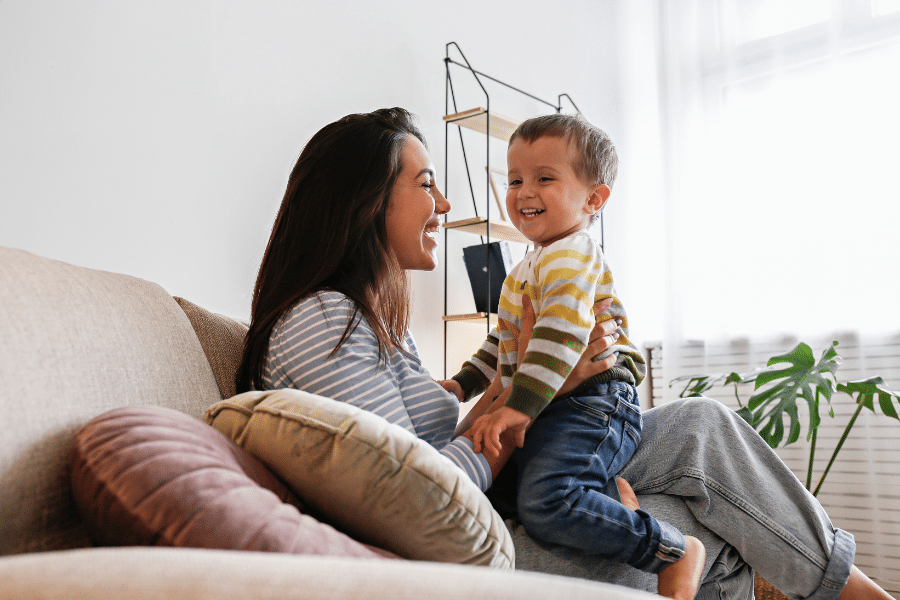
Kids need exposure to the right kind of stimulation so that they will develop the necessary skills. Language is one of the most critical skills to learn during the toddler years. The earlier we detect a problem and do something about it, the better the outcome will be.
It’s a common misconception that when a child has a speech delay, we can wait it out and see if she catches up. But we now know that early intervention is extremely important.
So if you have any concerns about how your child is talking, or about how your child understands what you tell them, tell your doctor immediately.
What is language development?
There are two types of language development milestones that doctors look for in children.
Receptive Language
This is your child’s ability to understand and comprehend spoken language. The following are some of the significant receptive language milestones in the first three years of life:
- Turning when you call his name
- Knowing the things he sees every day (like a ball, block, or spoon)
- Understanding parts of the body
- Following one-step commands – For example, “Give me the ball.”
- Following two-step commands – For example, “Pack up your toys and wash your hands.”
Expressive Language
This is what your child says and the sounds and words that she makes. These are the major expressive language milestones in the first three years of life:
- Cooing – As a newborn, your baby’s verbal communication consists of crying. She will cry to let you know that she is hungry, tired, or overstimulated. Sometime in the second month, she will start to make sounds other than crying. At first, these sounds will consist mostly of vowels. This is called cooing.
- Babbling – When your baby is 5-6 months old, she will start to babble, or make sounds that consist of both consonants and vowels. These are repeated syllables, like dadada, tatata, mamama.
- Jargoning – Sometime near her first birthday, what she says will start sounding like language. But the words won’t be that clear yet at first. Most parents will say something like, “She sounds like she is speaking in a foreign language!”
- Around her first birthday is an exciting time. She would soon be speaking her first real word!
- We expect children to have 7-10 words at 18 months, and 50 words at two years. Your child’s language skills will be exploding!
- These should be different kinds of words. Some would refer to people (mom, dad); everyday objects (ball, spoon); things she is interested in (animals or things she sees around her); and maybe a few adjectives and action words (cold, ouch, play, eat).
- If a child has several words but they are all the same thing – for example, different types of vehicles, or different species of dinosaurs – and there are no other words in your child’s vocabulary, mention this to your doctor.
Free RESOURCE LIBRARY
Sign up below and get FREE access to the Discerning Parenting Resource Library!
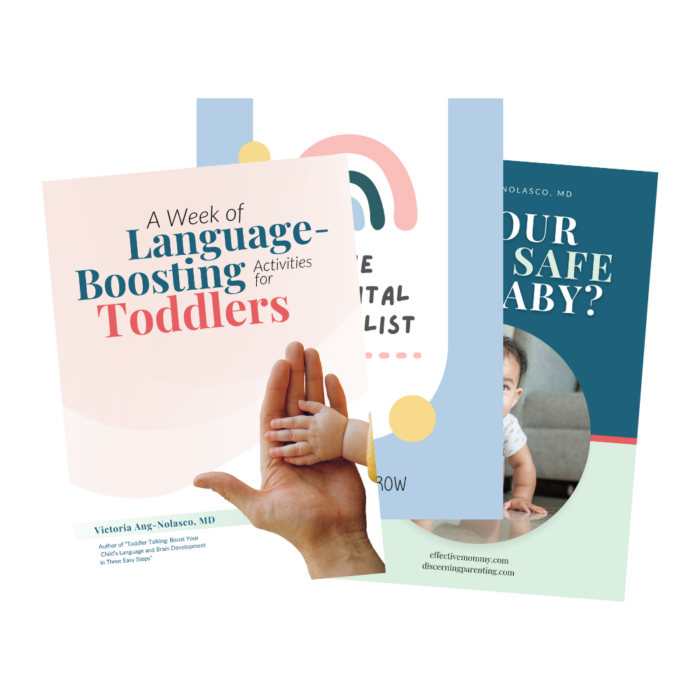
What language skills do we expect during the toddler years?
Here are some of the major language milestones that we expect during the toddler years.
12 Months
- Responds to simple spoken requests
- Uses simple gestures, like shaking head “no” or waving “bye-bye”
- Makes sounds with changes in tone, so that it sounds more like speech
- Says “mama”, “dada”, and exclamations like “uh-oh”
- Tries to imitate words that you say
18 Months
- Says several single words
- Says and shakes their head “no”
- Points to show someone what they want
These are approximate ages – the average ages that kids learn these skills. Some achieve the milestones earlier, others later.
Child development is not a contest. Do not feel pressured, and do not pressure your child.
Warning signs of possible language delay during the toddler years
That said, there are certain skills that, if not present at a certain age, would be considered red flag signs:
- 1 year: does not turn to you when you call his name
- 1 year: does not know common objects
- 1 1/2 years: does not know his body parts
- 2 years: does not speak in two-word phrases
If any of these red flag signs are present, you should tell your doctor. If at any time, you have concerns about your child’s language development, or if you are concerned about whether or not your child can hear well, you should tell your doctor too.
Both receptive and expressive language are critical in language development. We usually notice more what a child says, but it’s just as important to check what he is able to understand.
Words should be used with communicative intent. What does this mean? This means that your child should be using words to interact with others, and not just reciting something by rote.
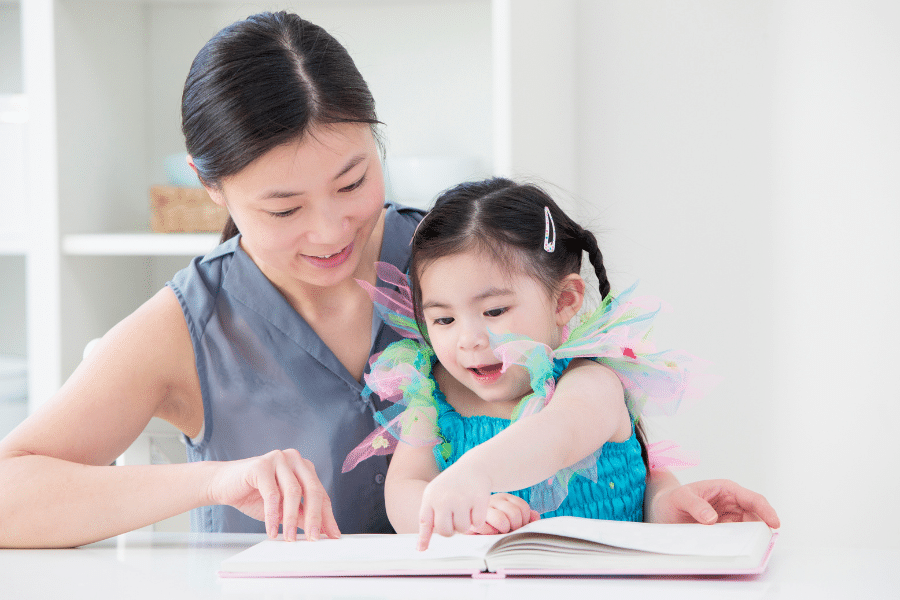
It’s just as important to look at the nonverbal aspect of language. When your child sees a bird, points to it, looks at you, and says excitedly, “Bird!” – this is excellent!
This is much more important than being able to recite the alphabet or count to ten by rote. The most important thing for your child to learn during this time is to combine words, gestures, tone, and facial expressions to be able to communicate with others.
Even something like taking turns in a conversation, knowing how loud or softly to speak in different situations – these are all things that kids are learning at this time. We often take these things for granted, but these are important lessons!
How to get started with stimulating your toddler’s language development?
What do you need to get started? NOTHING! Seriously. You don’t need to buy anything. You don’t need to spend on the latest toy that promises to help your child develop language skills. You don’t need to enroll your baby or toddler in fancy classes or buy that expensive online program. You just need to talk with your child.
Research has shown that the more words a child hears, the better his language develops. These words have to be directed at your child. He has to hear them actually spoken to him.
That’s why it is important to talk with your child in everyday situations. Do this while you are giving him a bath, during your meals, or when something happens. “Oh, look at that cat that just passed by outside our window!” “You spilled your drink! That’s OK. We will clean it up.”
Words that a child hears from videos or gadgets don’t count! Studies show that kids at this age do not learn from watching TV or videos. So if you were hoping to let him learn Japanese by playing some Japanese videos in the background, sorry, we’re out of luck.
Brain scans of babies who heard an actual person speaking a foreign language to them show that they do retain the memory of having heard that language. But this doesn’t happen when they just watch a video.
Until now, there is no research showing that babies and toddlers learn language from watching videos.
Yes, kids might repeat some of the words by rote. What parent hasn’t had a toddler constantly repeat what he heard from a video (sometimes with embarrassing results!)? But this is different from actual understanding and learning.
7 Tips for Success in Language Stimulation
1. Talk with your child.
Interact with her. We cannot say this enough. There is no substitute for you talking with your child, with her seeing your gestures and facial expressions. This is the single best thing you can do for his brain development. When talking with babies, researchers also found that using motherese – a higher-pitched voice – catches their attention better. This is probably why many people instinctively talk with babies this way!
2. Respond to what your child says.
When your child says something, respond. Look at him. Look at where he is pointing. Harvard University calls this “serve and return interactions.” These interactions are extremely important for his developing brain. This excellent article from the Center on the Developing Child at Harvard University shows the exact ways to build serve and return interactions.
3. Get down on the floor and play with your child.
Babies and young kids learn through play. Get down to her level, where you are face-to-face with each other. Let her be creative.
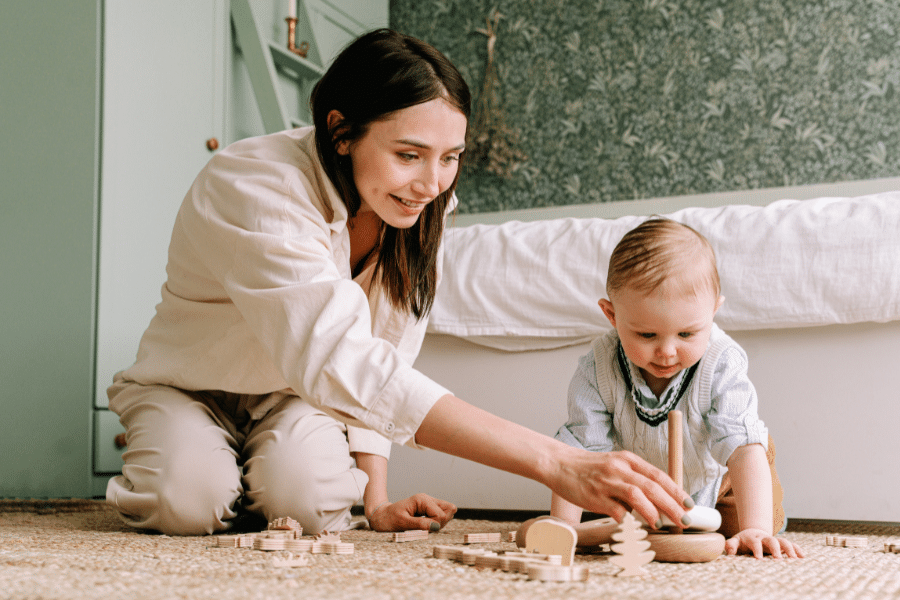
4. Read a book with your child every day.
No age is too early to start. You can start as early as when he is a baby. This does not mean teaching him to read. The purpose is to interact with him. Let him feel safe and comforted as you cuddle him while you read. Enjoy the experience of you making silly sounds, trying different voices, and making all sorts of facial expressions.
5. Don’t stress about teaching academic skills.
The first three years of life are all about interactive communication, play, and learning social and emotional skills. They are not about academics. There is plenty of time to learn ABCs later. Many parents today are worried about whether their children will do well in school, and this becomes a source of stress for them. Being a parent is stressful enough. Don’t add to the stress needlessly. Research shows that the most successful people in life are those who have developed skills like emotional regulation and people skills. Academic skills are not on the list.
6. Put down your smartphones.
Research shows that being on a smartphone cuts down on the parent’s ability to respond to a child’s cues. This interferes with the serve and return interactions that are vital for brain development.
7. Sing nursery rhymes together. Dance and exercise too!
Nursery rhymes help with language development. (Again, not the kind on screens!) Physical activity and movement also support overall brain development. As a bonus, studies also show that more active children have a more expansive vocabulary.
Check out our other episodes on toddler development, and sign up also for our free parenting toolkit that includes a guide with a week of language stimulation activities for toddlers.

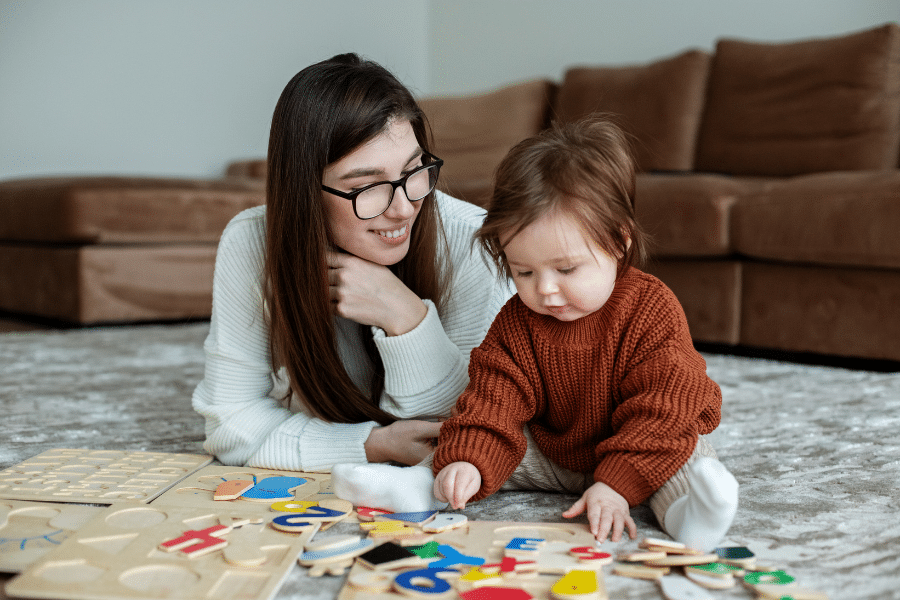
2 Comments
Comments are closed.